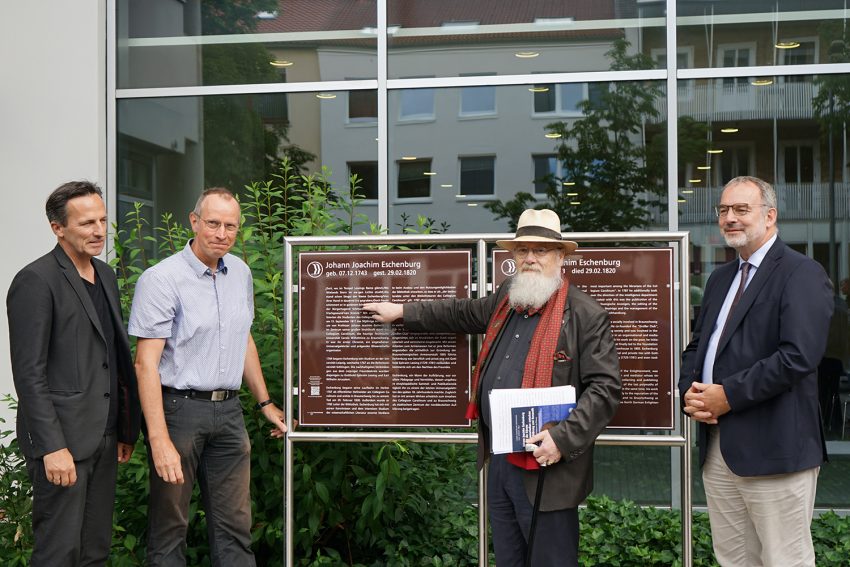Universal Scholar and Librarian of the Collegium Carolinum Honoured Commemorative plaque for the Braunschweig resident Johann Joachim Eschenburg (1743-1820)
Anyone walking past Pockelsstraße at the height of the University Library will probably notice it right away: The new personality plaque commemorating Johann Joachim Eschenburg. With a short stop, you can learn interesting facts about the last Braunschweig polymath and probably the most famous of Braunschweig’s librarians.
In the winter semester of 1767, Johann Joachim Eschenburg began his professional career as a lecturer and public court master at the Braunschweig Collegium Carolinum, the predecessor institution of today’s TU Braunschweig. In 1773 he was appointed associate professor and in 1777 full professor of fine literature and philosophy. In 1814 he also became a member of the board of directors until his death on 29 February 1820.
“In the course of 53 years, Eschenburg worked on all fields of science and art at the Collegium Carolinum; first philosophy and literature, then music, finally the fine arts and the natural sciences. […] His place in the history of knowledge resembles Goethe’s in that he, as an individual, once again, and for the last time, attempted to survey and productively master all fields of knowledge”, Cord-Friedrich Berghahn and Till Kinzel state in their introduction to the latest anthology on Eschenburg.1)
As an excellent expert on world literature, Eschenburg “made the Collegium Carolinum the centre of intensive literary mediation and research”, according to Berghahn and Kinzel. Nevertheless, Eschenburg’s life and work have received little attention in historical research. In Braunschweig today, the name of a short street in the northern part of the city between Rebenring and Nordstraße commemorates the urbane scholar.
First chronicler of the Collegium Carolinum
Eschenburg was a philologist and as a translator – especially known for his work on Shakespeare – a theoretician of the sciences, a mediator in the field of literature, art and music, a lyricist of the Enlightenment and a philosopher – precisely a paradigmatic “model figure of the late Enlightenment, whose significance for the present lies above all in his cross-disciplinary competence” and an “exemplary citizen of the republic of scholars in the late Enlightenment who was active in numerous networks”. In the course of his scholarly life, he wrote numerous books, in addition to textbooks and translations, as well as his own poetry. In 1812, he wrote his “Entwurf zur Geschichte des Collegium Carolinum“ (Draft for the History of the Collegium Carolinum). He is thus the first chronicler of the predecessor institution of TU Braunschweig.
As an excellent expert on world literature, Eschenburg “made the Collegium Carolinum the centre of intensive literary mediation and research”, according to Berghahn and Kinzel. Nevertheless, Eschenburg’s life and work have received little attention in historical research. In Braunschweig today, the name of a short street in the northern part of the city between Rebenring and Nordstraße commemorates the urbane scholar.
Franz Josef Meyen described Eschenburg as the most outstanding of the Braunschweig professor-librarians. As head of the library of the Collegium Carolinum, which at that time comprised almost 5,000 volumes, he did valuable work. The index he added to the library catalogue of his predecessor Johann Friedrich Tünzel – the first of its kind – for better usability still exists today. Lectures on library science in the broadest sense were an integral part of his teaching at the Collegium; the textbooks he wrote on the subject appeared in several editions. The library also owes precious acquisitions to him, who was responsible for its upkeep longer than his predecessors, above all through the takeover of books from the dissolved Riddagshausen monastery library.
Personality plaque unveiled

The personality plaque at the University Library was unveiled by Dr. Ulf Hilger, Robert Strötgen, Prof. Gerd Biegel and Prof. Manfred Krafczyk (from left). Photo credit: Henning Peters/TU Braunschweig
At the beginning of July, Professor Manfred Krafczyk, Principal Vice President for Digitalisation and Sustainability, and Library Director Robert Strötgen, together with Dr. Ulf Hilger, Science Officer of the City of Braunschweig, and Professor Gerd Biegel, unveiled a personality plaque for Johann Joachim Eschenburg on Pockelsstraße. The proposal to erect such a plaque in the area of today’s University Library was made by Professor Gerd Biegel, former director of the Braunschweig State Museum, who also wrote the bilingual plaque text.
17 further personality plaques in the city area are dedicated to people who were associated with TU Braunschweig or its predecessor institutions, the most famous among them being Carl Friedrich Gauss, whose personality plaque can be found on the Gaussberg.
Incidentally, a plaque from the series of cultural monuments also stands in Pockelsstraße in front of the Historic Main Building and tells more about the history of the building.
1) Berghahn, Cord-Friedrich; Kinzel, Till (2013): Johann Joachim Eschenburg und die Kulturen des Wissens zwischen Aufklärung und Romantik, in: Berghahn, Cord-Friedrich; Kinzel, Till (Hg.) (2013): Johann Joachim Eschenburg und die Künste und Wissenschaften zwischen Aufklärung und Romantik. Netzwerke und Kulturen des Wissens. Wissenschaftliche Tagung. Heidelberg: Winter (Germanisch-romanische Monatsschrift GRM-Beiheft, 50), S. 9-16.
